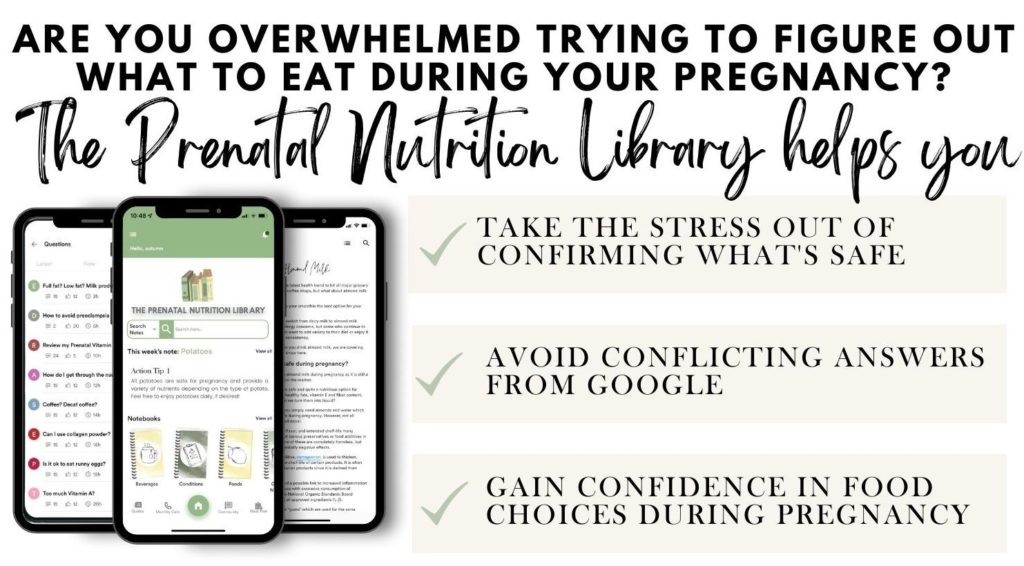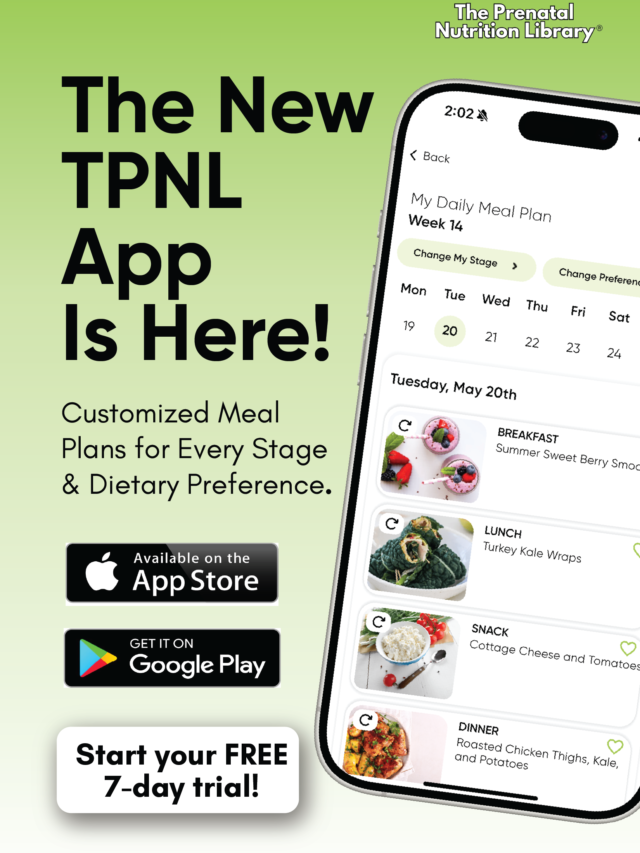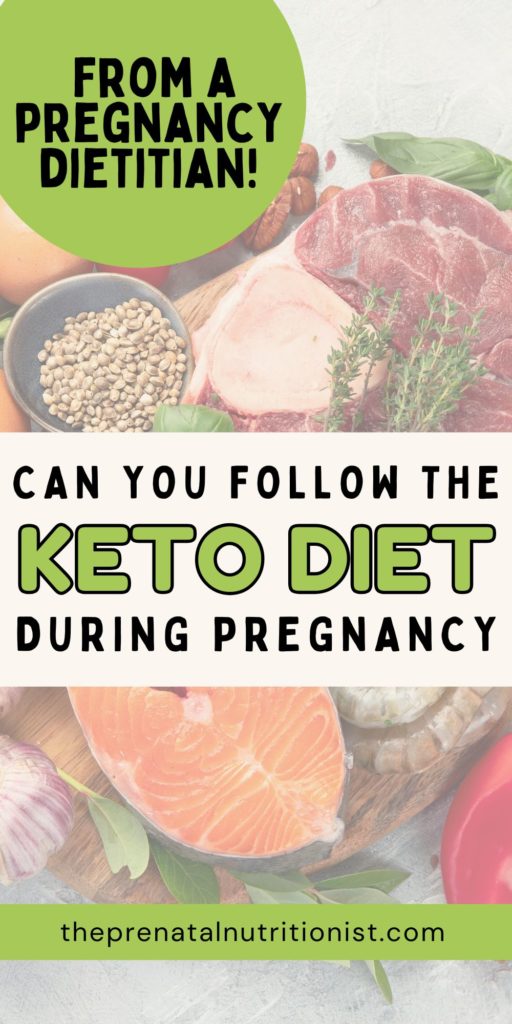
A ketogenic diet, or keto diet, is a dietary style that involves eating high amounts of fat, moderate amounts of protein, and very little carbohydrates. Traditionally, this diet was developed as a treatment for epilepsy. It has been effective for this use. But is it safe and effective for other populations? And what about keto diets during pregnancy?
Pregnancy is a unique time when nutrient needs and demands are heightened and weight gain is normal. Susceptibility to and prevalence of nutrient deficiency can be more common in pregnancy. This means, spoiler alert, pregnancy is not an ideal time to restrict the diet more than necessary. One of the diets I am asked about the most is the keto diet. I’m going to address the keto diet during pregnancy in this post. Can you (or should you) do keto while pregnant? Let’s get into it!
Can You Do Keto While Pregnant?
I’m often asked about the keto diet, how effective it is, and whether or not it’s safe for pregnancy. My hope is that this post will answer any questions you have about the safety of the keto diet during pregnancy. And ultimately, help you feel comfortable and confident that you can have a healthy pregnancy without restricting multiple food groups.
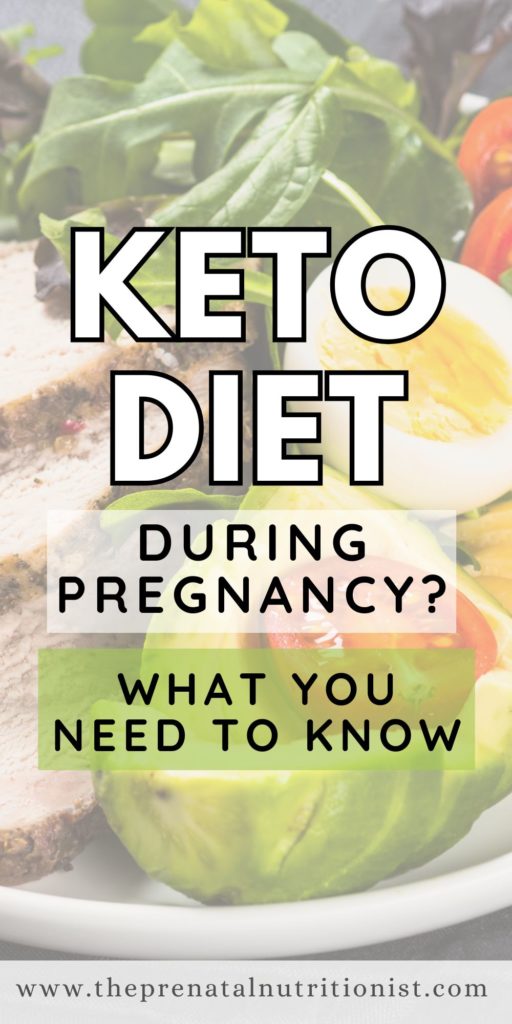
What Is A Keto Diet?
A ketogenic diet is a diet that is high in fat, moderate in protein, and very low in carbohydrates. The exact macronutrient distribution for this diet varies depending on the source, but traditionally, it is somewhere around the following:
- 70 to 80% fat
- 10 to 20% protein
- 5% to 10% carbohydrates
Followers of the keto diet usually consume no more than 20 to 50 grams of carbs daily. Carbohydrates are broken down into glucose and used as the primary source of fuel in the body. An ultra-low-carb diet, like the ketogenic diet, forces the body to use ketones for fuel rather than glucose. When your body breaks down fat, it produces chemicals called ketones. This is where the word “ketogenic” comes from.
Low-carb diets have been around for decades. In recent years the ketogenic diet has become one of the most popular forms of a low-carb diet. It remains one of the most popular diet plans to date, alongside the Mediterranean diet, the paleo diet, and Weight Watchers. The ketogenic diet was the most Googled diet in the United States in 2020, with 25.4 million unique searches. Despite its popularity outside of pregnancy, its practical and safe use during pregnancy is still questionable.
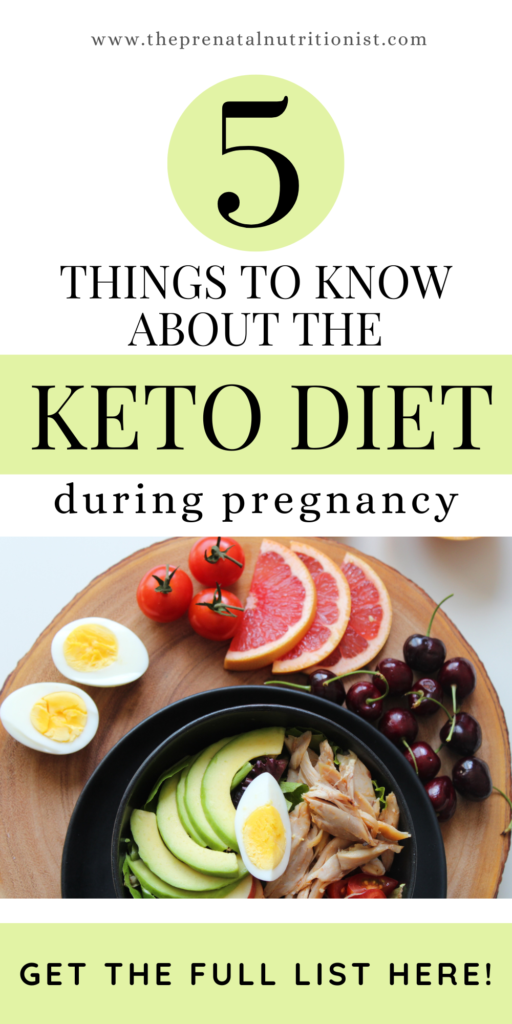
Potential Side Effects of the Keto Diet During Pregnancy
Difficulty Meeting Micronutrient Needs
It can be challenging to meet micronutrient needs for pregnancy when multiple food groups are restricted. Micronutrients are vitamins and minerals like folate, iodine, calcium, and b vitamins. It’s possible to meet needs, but it would take much more careful planning. The ketogenic diet is not just restricting grains or carbohydrate foods like fruits and starchy vegetables. Traditional keto diets also limit protein intake because protein can be used as a substrate for the process of gluconeogenesis. Ultimately what this means is that “too much” protein on a ketogenic diet can interfere with getting into the metabolic state of ketosis.
Constipation
Constipation is a common side effect of following the keto diet at any time, including during pregnancy. Very few carbohydrates also tend to mean very low amounts of fiber are consumed when following the keto diet. Fiber is important to keep things ‘moving’ through your digestive system.
Keto Flu Symptoms
Many people have experienced the following side effects in the first few days of starting a keto diet. This collection of symptoms has been nicknamed “the keto flu.” The symptoms that fall under the “keto flu” could include the following:
- fatigue
- dizziness
- nausea
- vomiting
- dehydration
- bloating
- stomach pain
- gassiness
- constipation
- diarrhea
- headaches
- bad breath
- muscle cramps
Keto Diet And Pregnancy Research and Reviews
- Effects of a Ketogenic Diet during Pregnancy on Embryonic Growth in the Mouse
- Effect of Elevated Ketone Body on Maternal and Infant Outcome of Pregnant Women with Abnormal Glucose Metabolism During Pregnancy
- Clinical Implications for Women of a Low-Carbohydrate or Ketogenic Diet With Intermittent Fasting
- Gestational Ketogenic Diet Programs Brain Structure and Susceptibility to Depression & Anxiety in the Adult Mouse Offspring
Is Keto Safe During Pregnancy?
Generally, pregnant women should avoid unnecessarily restricting foods, especially multiple major food groups. A ketogenic diet calls for you to strictly limit carbohydrates, which includes food groups like fruits, dairy, starchy vegetables, and grains. As mentioned above, there is also a limitation on protein intake. These restrictions can hamper nutrient intake during pregnancy. Keep in mind a “lower-carb” diet is very different than a keto diet, although the names are primarily used interchangeably now.
Many people wonder if keto diets are safe during pregnancy, but current evidence suggests they may not provide the full range of nutrients needed to support a growing baby. An eating pattern high in protein with a substantial amount of fat and a low to moderate amount of carbohydrates is safe for pregnancy. You can learn more about this inside The Prenatal Nutrition Library, where we will teach you how to calculate your protein needs and review what fats to include and avoid during pregnancy.
Carbohydrates are a source of energy as well as fiber. Fruits and starchy vegetables also provide various crucial vitamins and minerals. For example, folate in strawberries and potassium in sweet potatoes. Folate is especially important in early pregnancy to support neural tube development, which forms the baby’s brain and spinal cord. Additionally, many times, carbohydrate choices are the only foods that sound appetizing during times of first-trimester nausea and food aversions. For some of my favorite carbohydrate choices for pregnancy, check out my pregnancy grocery list.
Following a “diet” during pregnancy can feel extremely limiting, not just from a nutrition perspective but also from a social and mental health light. Going out to eat with friends during pregnancy can be hard enough without the added layer of stress that your meal fits the keto diet plan. Following a ketogenic diet during pregnancy may deprive you and your baby of macronutrients, vitamins, and minerals that are important for a healthy pregnancy. During pregnancy, a balanced diet with carbs and plenty of protein is typically most well-tolerated, nutrient-dense, and enjoyable.
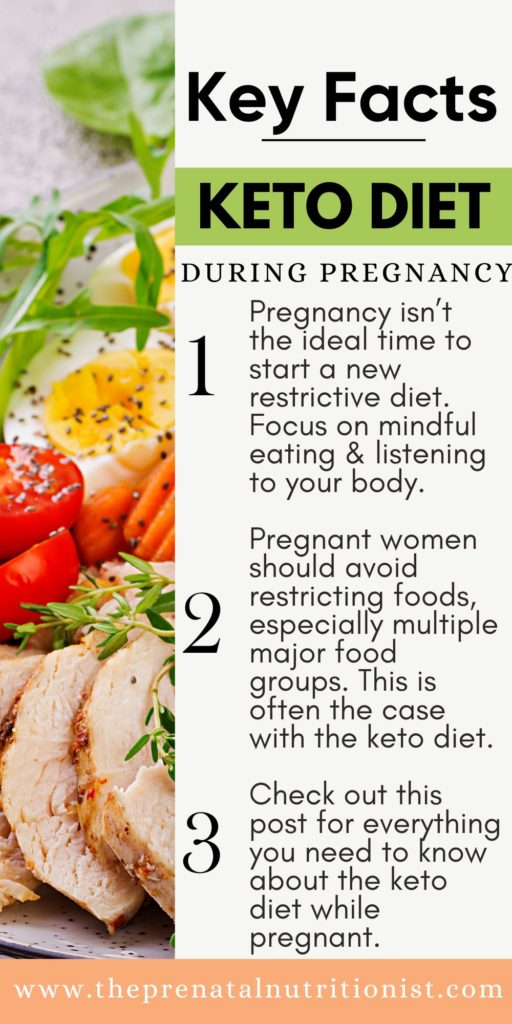
What Does A Healthy Pregnancy Diet Look Like?
A healthy pregnancy diet includes all major food groups.
A healthy pregnancy diet is a well-balanced diet that includes all of the major food groups. Pregnant people benefit from consuming an array of foods, including meats, fats, and vegetables, as well as foods that have carbohydrates like dairy products, fruits, and whole grains to support their unborn baby’s growth and development and help lay the foundation for a healthy baby.
Aim to eat a balance of fiber, protein, and fat in most of your meals throughout the day.
Focus on fiber-rich and whole-grain carbohydrates over refined carbs.
Fiber-rich foods are an important part of a well-balanced diet. We encourage choosing real, whole-food sources of carbohydrates versus processed foods most of the time. For example, fruits, vegetables, full-fat dairy, and whole grains like quinoa or oatmeal.
Limit your consumption of refined carbohydrates, like white bread, snack crackers, and added sugars that can spike your blood sugar. Proper blood sugar management is important for all pregnant people, not just those diagnosed with gestational diabetes. If sugary cereal has been one of your go-to breakfasts, consider some of these more pregnancy-friendly, gestational diabetes breakfast ideas most days of the week.
While it’s common for people to wonder whether they should lose weight during pregnancy, it’s important to focus instead on nourishing your body with nutrient-dense foods that support both your needs and your baby’s development long term. Intentional weight loss during pregnancy is generally not recommended unless under the specific guidance of a healthcare provider.
With so many nutrition trends circulating online, it can be difficult to know which diets are safe during pregnancy and safe for your health conditions. In most cases, restrictive diets can limit your intake of key nutrients needed for a healthy pregnancy. A balanced, inclusive approach to eating is typically the most sustainable and supportive for both parent and baby.
Healthy pregnancy diets include healthy fats.
Don’t get us wrong; healthy fats are an important part of a complete and balanced pregnancy diet. If you’re familiar with the keto diet, you’re no stranger to fat. Fats serve many functions and are needed to absorb the fat-soluble vitamins A, D, E, and K. It’s important to choose quality fats to support your pregnancy.
Some of the best sources of healthy fats include salmon, avocado, coconut oil, ghee, nuts, seeds, full-fat dairy, and extra-virgin olive oil.
Millions of people follow the keto diet, but this ultra-low-carb eating pattern is likely not the ideal choice for you during pregnancy.
Pregnancy isn’t the ideal time to start a new restrictive diet or follow any restrictive diet! Instead, we encourage leaning into your hunger cues and “cravings,” plus focusing on nourishing you and your growing baby. A great way to help ensure you’re getting all the necessary nutrients (and actually enjoying your food) is to follow a well-balanced diet that does not include restricting macronutrient groups or multiple food groups.
Healthy eating doesn’t have to be a chore! In fact, you might be surprised that the numerous benefits of good nutrition during pregnancy can happen while still enjoying the foods you love. I encourage you to avoid “dieting” of any form and instead focus on nourishing yourself and your baby by including nutrient-dense foods at each meal.
If you’re ready to jump into the nourishment for two mindset, I encourage you to check out the blog and sign up for The Prenatal Nutrition Library as soon as possible. When you join TPNL, you will unlock access to HUNDREDS of guides with information on good nutrition before and during pregnancy, in addition to trimester-specific meal plans so you have a clear guide on how to eat well during pregnancy. See you inside!


